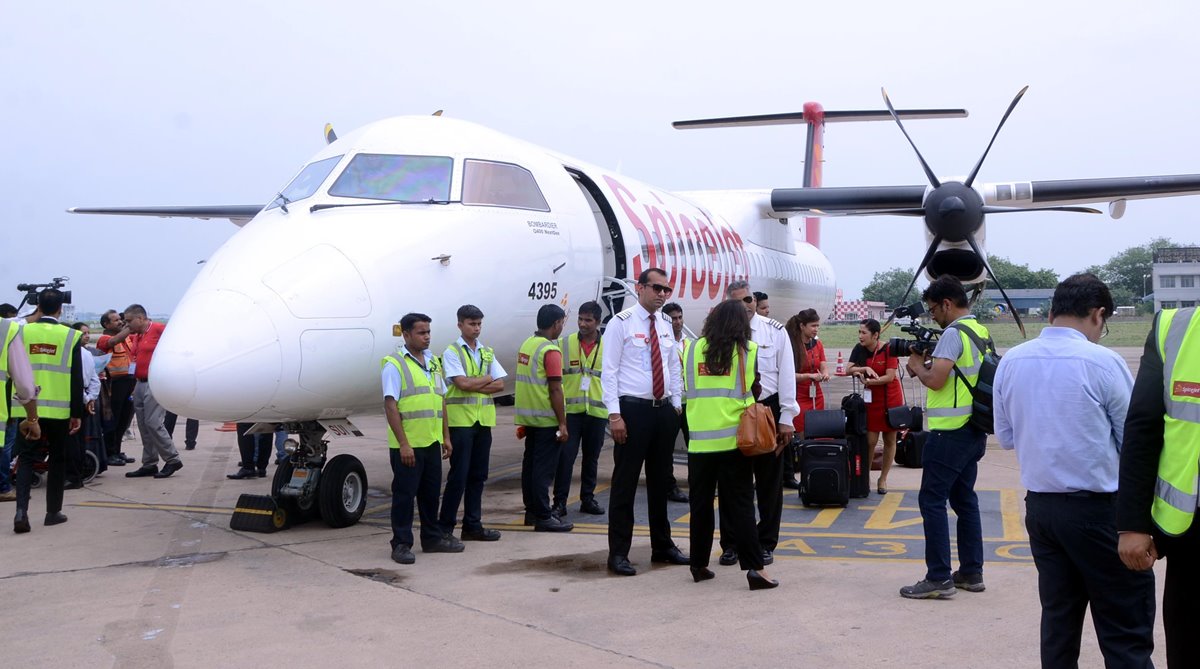Dense fog disrupts flights at Bagdogra
Bagdogra Airport faced temporary disruptions today as dense fog forced the diversion of five flights—four Indigo and one SpiceJet—to alternative airports.
SpiceJet Chairman and Managing Director Ajay Singh said biojet fuel is low cost and helps in significantly reducing carbon emissions.

The SpiceJet flight operated a test flight on bio fuel between Dehradun and Delhi on August 27. (SNS Photo: Subrata Dutta)
Uttarakhand Chief Minister Trivendra Singh Rawat flagged off the country’s first biojet fuel aircraft, operated by SpiceJet, from Jolly Grant Airport in Dehradun on Monday.
A Bombardier Q400 aircraft, partially using the biojet fuel, landed at the Delhi airport after taking off from Dehradun. At least 20 people, including officials from the Director General of Civil Aviation and SpiceJet, were on the test flight.
Advertisement
The airline said it successfully operated “India’s first ever biojet fuel flight”, the duration of which was around 25 minutes.
Advertisement
The fuel is a mixture of Jatropha oil and hydrogen. According to the airline, it’s a blend of 75 per cent air turbine fuel (ATF) and 25 per cent biojet fuel.
To manufacture this fuel, a plant has been set up at the Indian Institute of Petroleum (IIP), part of the the Council of Scientific & Industrial Research in Dehradun. Bio jet fuel is being prepared in the institute. Jatropha seeds have been purchased from Chhattisgarh through the Bio-Fuel Development Authority.

Earlier, SpiceJet operated a trial run using the bio-fuel. It was reported that commercial aircraft using bio-fuel in countries like America and Canada had already taken flights. On the occasion of the flag-off on Monday, Minister of State for Women Welfare and Child Development Rekha Arya, IIP Director Anjan Kumar Ray, JP Gupta from SpiceJet, Captain Satish Chander Pandey and scientists from IIP were present.
READ | Eco-friendly aviation action plan by 2035: Suresh Prabhu
In a statement, the airline said the advantage of using biojet fuel as compared to ATF was that it would reduce carbon emissions and enhance fuel efficiency.
SpiceJet Chairman and Managing Director Ajay Singh said biojet fuel was low cost and helped in significantly reducing carbon emissions.
“It has the potential to reduce our dependence on traditional aviation fuel by up to 50 per cent on every flight and bring down fares,” he said.
The biojet fuel has been recognised by American Standard Testing Method (ASTM) and meets the specification standards of Pratt & Whitney and Bombardier for commercial application in aircraft.
The Q400 aircraft has 78 seats.
According to global airlines’ body IATA, aviation industry contributes to two per cent of the total global greenhouse gas emissions.
IATA has also set out a target for one billion passengers to fly on aircraft using a mix of clean energy and fossil fuels by 2025, the release said.
SpiceJet has a fleet of 36 Boeing 737NG and 22 Bombardier Q400 planes. On an average, it operates 412 flights daily.
(With agency inputs)
Advertisement